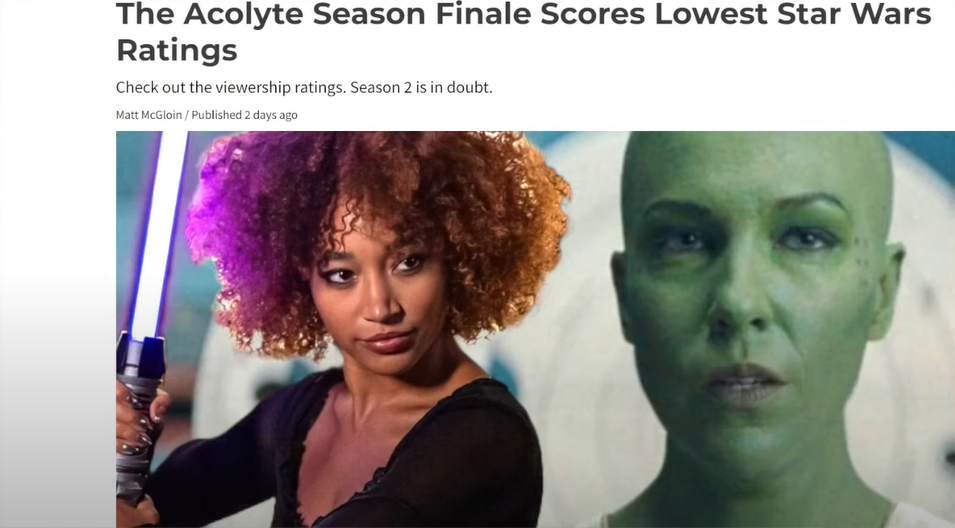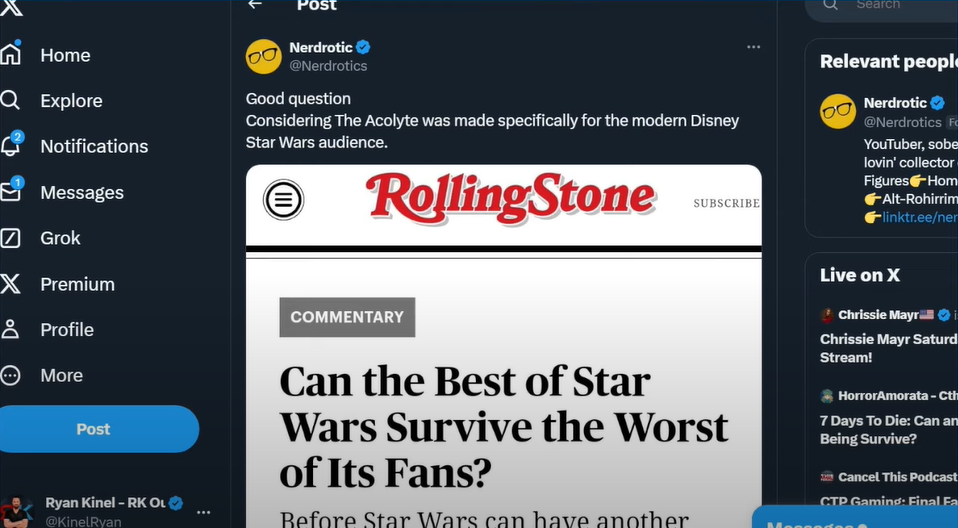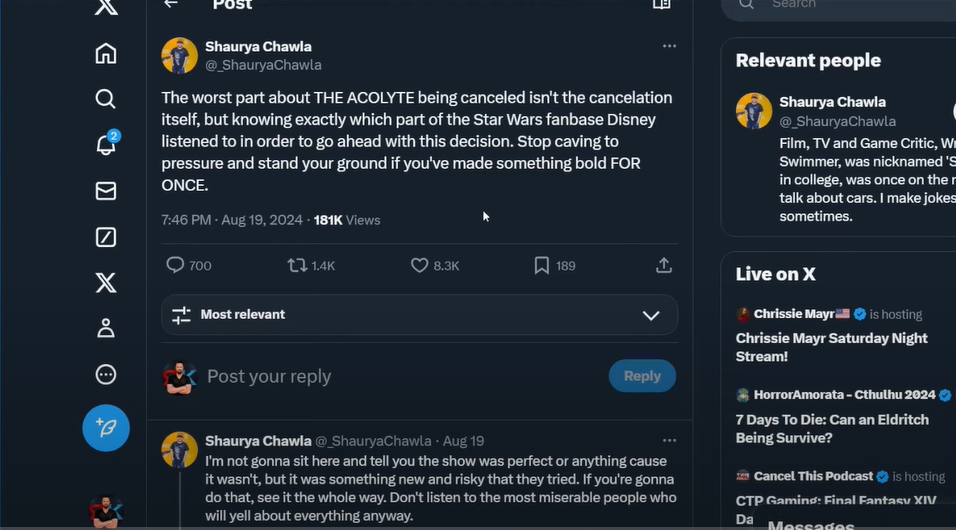In a dramatic turn of events, Disney’s The Acolyte—a highly anticipated and heavily marketed Star Wars series—has been officially canceled after just one season. The cancellation of the show, which reportedly had a budget of $180 million, has triggered a wave of reactions across the media landscape. Many fans and commentators are pointing fingers at Disney and mainstream media outlets, accusing them of unfairly blaming fans for the show’s poor performance rather than accepting responsibility for the series’ failure.
The Lowest Viewed Star Wars Show Ever
The Acolyte entered the Disney+ lineup with high expectations, but it quickly became apparent that the show wasn’t resonating with audiences. According to reports, the series registered the lowest viewership numbers of any Star Wars project in Disney history, with its finale being 40% less watched than even the much-criticized Ahsoka series.

One of the show’s harshest critics, who goes by the YouTube handle “Ryan Kinel – RK Outpost,” emphasized the lack of momentum from the start:
“It would be one thing if you know maybe it didn’t attract a lot of people at once, but the momentum was there… no, it didn’t. It fell off from the already low start that it had.”
For Disney and Lucasfilm, these lackluster numbers were the final nail in the coffin, leading to the cancellation of any plans for a second season.
Media Pushes Back, Blames Fans
In the aftermath of the cancellation, much of the mainstream media has come to the defense of the show, framing its demise as a result of toxic fan culture. Rolling Stone, in particular, published an article titled “Can the Best of Star Wars Survive the Worst of Its Fans?” which suggests that a vocal minority of Star Wars devotees are resistant to change and diversity within the franchise.
“Before Star Wars can have another successful show, some vocal parts of the fandom have to reckon with what they really want out of the franchise,” Rolling Stone wrote, suggesting that conservative voices in the fanbase are limiting the evolution of Star Wars.
This narrative, however, has been met with backlash from various corners of the Star Wars fan community. YouTubers and content creators have accused the media of ignoring the real reason for the show’s failure: poor storytelling.

“You know what the vast majority of fans out there are asking for? They’re not asking for Star Wars to be all white men. They’re asking for good stories,” Ryan Kinel retorted, voicing the frustration of fans who believe the focus should be on narrative quality rather than identity politics.
A Show for a Small Audience
One of the central critiques from the fanbase is that The Acolyte seemed to be more of a social statement than an engaging Star Wars story. The show was widely seen as catering to a smaller, more niche audience that prioritizes diversity and representation above traditional storytelling.
Kinel puts it bluntly:
“The modern audience, the Young activists out there who don’t care if it’s good or not, we just want diversity and representation—that’s who this catered to. Unfortunately, you now know the reality: There’s not enough of you to make a show like this an actual success.”
This argument highlights a growing divide in entertainment between traditional fans who are focused on engaging plotlines and characters, and modern media proponents who push for more diversity and representation, sometimes at the cost of those elements.
The “Toxic” Fan Debate
The media’s focus on blaming so-called toxic fans for the show’s failure has sparked debate within the broader Star Wars community. Rolling Stone, along with other outlets, has suggested that the backlash from conservative and traditionalist fans contributed to the show’s downfall. These fans, it is claimed, have made it difficult for Disney to explore new stories and characters, particularly those centered on diverse identities.
“While Disney has never said those voices are directly impacting what shows get made, the vocal minority of Star Wars devotees keep limiting what they’ll accept as true Star Wars,” wrote Rolling Stone.
However, this portrayal of fans has been rejected by many within the community. Critics argue that such narratives overlook the actual reasons for The Acolyte’s failure: weak storytelling and unrelatable characters.

Kinel’s response to these accusations was pointed:
“They are catering to you people, and they just discovered there’s not enough of you to actually make this work.”
The Future of Star Wars Content
The cancellation of The Acolyte has raised broader questions about the future of Star Wars under Disney’s leadership. After a series of divisive releases, from The Last Jedi to The Book of Boba Fett to Ahsoka, fans are wondering whether Disney is listening to the long-time fanbase that made Star Wars a cultural phenomenon in the first place.
Many fans and commentators argue that Disney’s current strategy of focusing on identity politics and diversity over storytelling may be alienating the franchise’s core audience. The question for Disney now is whether they will recalibrate their approach to future Star Wars content or continue down this controversial path.
A Dangerous Precedent for Hollywood?
Rolling Stone further warned that the cancellation of The Acolyte could set a dangerous precedent in Hollywood. If studios begin to shy away from projects that focus on progressive themes due to backlash from traditionalist audiences, it could signal a retreat from the inclusivity that many in the industry have been advocating for in recent years.
“Disney canceling Star Wars’ The Acolyte is a dangerous precedent and it’s bad news for the future of Star Wars and Hollywood,” stated the article.
Yet, critics of this view point out that Hollywood’s primary goal is to make money, and if a show fails to attract viewers—regardless of its progressive messaging—then its cancellation is simply good business. As Kinel noted,
“Disney certainly didn’t cancel this to appease YouTubers. They canceled it because no one watched it.”
Conclusion: A Fanbase Divided
The fallout from the cancellation of The Acolyte highlights the deep divide within the Star Wars fanbase, and more broadly, the entertainment industry. On one side are the traditional fans who are asking for quality storytelling, while on the other side are media outlets and progressive voices who emphasize the importance of diversity and representation in modern entertainment.
As Disney and Lucasfilm move forward with their Star Wars slate, the question remains: will they listen to the vocal demands of their legacy fanbase or continue catering to the progressive audiences that have become increasingly influential in Hollywood?
Only time will tell, but for now, one thing is clear—The Acolyte was a failure, and the blame game is far from over.
Key Takeaways:
- The Acolyte was canceled due to low viewership and negative fan reactions.
- Mainstream media outlets like Rolling Stone blame toxic fans for limiting Star Wars’ potential for progress.
- Fans argue the show’s failure was rooted in poor storytelling and lack of engagement with the broader Star Wars community.
- The debate reflects a broader cultural divide within fandoms and the entertainment industry.
Star Wars may be a galaxy far, far away, but the battle over its future is very much happening right here.
